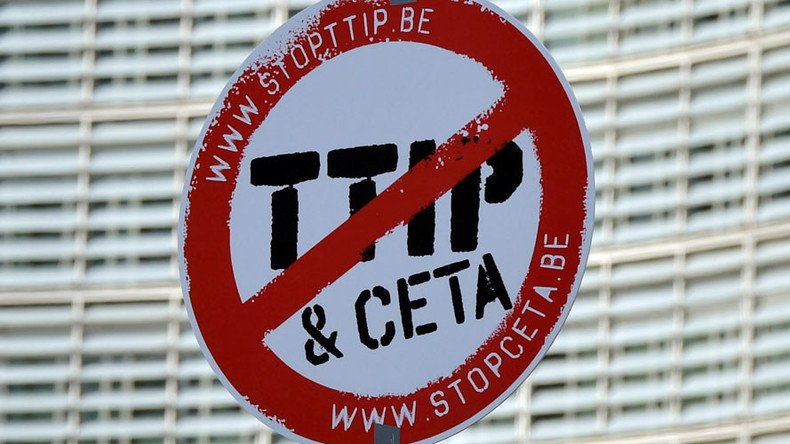Germany’s top court backs Canadian trade deal despite opposition

The German Constitutional Court has cleared the government to approve a trade treaty between Canada and Europe, rejecting a legal challenge from opponents who called it undemocratic.
Opponents object to parts of the Comprehensive Economic and Trade Agreement (CETA) will be implemented before all national parliaments in the EU have voted on it.
Germany is now clear to vote on CETA next week, which will need unanimous support from all 28 members of the bloc. If approved, it can be signed on October 27.
Campaigners against CETA, including rights groups Campact, Foodwatch and More Democracy have collected almost 200,000 signatures from Germans to protest the trade pact. The fear is that CETA will violate workers' rights and the agreement serves the interests of the wealthy elite.
.@ManuDeBock@christiemorreal#makehistory and #StopCETA. Millions of people across the EU are with you! https://t.co/Thr7RJFCsn
— Sum Of Us (@SumOfUs) 13 октября 2016 г.
There are also concerns among opponents that CETA will be used as a model to push through an even more controversial EU-US trade deal called TTIP, much of which remains to be negotiated.
Germany’s Economy Minister Sigmar Gabriel pushed hard for the deal, saying that if Berlin rejected it, "I don't want to think about the consequences that could have for Europe."
"I am very pleased that we have made a first big step, because if Europe were not able to deal with Canada, this would send a difficult signal in the world," he said after CETA was approved.
CETA is intended to eliminate tariffs on 98 percent of goods immediately after ratification and also encompasses regulatory cooperation, shipping, sustainable development and access to government tenders.
There is no unanimous decision on the trade pact among Europe. Southern Belgium is expected to block the deal, and there is uncertainty over Slovenia.
"We had hoped the negotiators would have at least tried to find some improvements, some corrections for Belgium. Today that hasn't happened. We will probably have, though I will leave it for each to say, a rejection by Brussels, in Wallonia and likely too the German-speaking side. Simply put, the south of Belgium is not in favor," Andre Antoine, president of the Walloon regional parliament told Reuters on Tuesday.
Austria’s decision will depend on ongoing negotiations between Canada in Europe and the declaration accompanying CETA.
"I hope that by then we have improved this contract enough that it is acceptable to us," said Austrian Chancellor Christian Kern. Canada has stressed the declaration will bring no additions to the deal.












